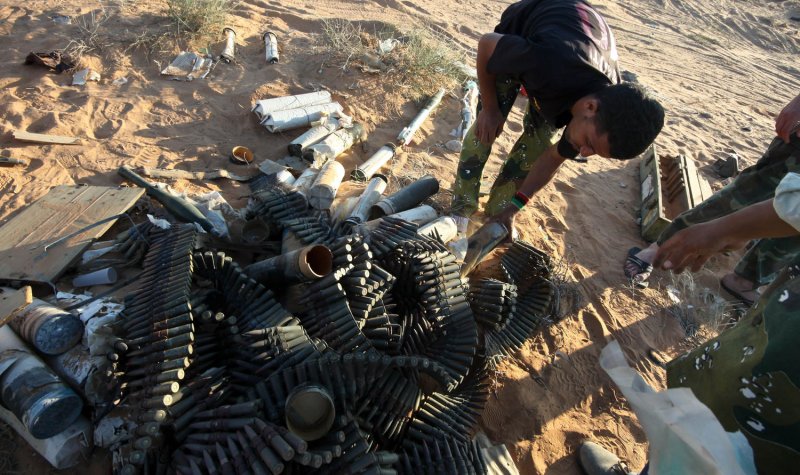1 of 6 | Libyan fighters loyal to the new regime in the desert before heading to the frontline in the nearby city of Sirte in eastern Libya, on September 23, 2011 , one of the last hold-outs of the the ousted dictator Moamer Kadhafi's forces. Desperate residents fled Moamer Kadhafi's hometown Sirte on Friday, as fighters of Libya's interim government probed the city's eastern outskirts in anticipation of a final assault on one of the fallen leader's two remaining bastions. UPI/ Amru Taha |
License Photo
WASHINGTON, Oct. 4 (UPI) -- Air assets of the U.S. Africa Command are being reassigned to monitor Libya's borders in the hunt for missiles looted from Moammar Gadhafi's arsenals.
U.S. Army Gen. Carter Ham, head of AFROCOM, said those assets include unmanned surveillance and reconnaissance vehicles but that that a number of Libya's shoulder-fired, anti-aircraft missiles may have been smuggled out of the country and could end up in the hands of terrorist groups.
The general's comments, in remarks at a forum at the Center for Strategic and International Studies in Washington, comes amid growing concern among NATO members that al-Qaida and its affiliates could come into possession of weaponry that could down civilian as well as military aircraft.
Reports from Libya say tens of thousands of heat-seeking surface-to-air missiles, including Russian-made SA-7s, have are missing from former Gadhafi arsenals amid the chaos of the dictator's ouster by rebel forces and continuing battles against Gadhafi loyalists.
The exact number of missing missiles is unknown but the Gadhafi regime was believed to have possessed as many as 20,000 of the weapons, most of which are unaccounted for.
Gen. Mohammed Adia, the National Transition Council officer in charge of armaments, recently told reporters that about 5,000 missiles were missing.
"Unfortunately, some of these missiles could have fallen into the wrong hands," he said.
The online version of Germany's Der Spiegel magazine quoted Adm. Giampaolo Di Paola, head of NATO's military committee, as telling German lawmakers as many as 10,000 missiles were missing.
Whatever the number, their potential threat is immeasurable. The U.S. State Department says as many as 40 civilian aircraft have been fired upon or hit by such missiles since the 1970s, including a DHL cargo plane in Iraq in 2003.
In 2002, terrorists fired at, but missed, a chartered Israeli airliner that was taking off from Mombasa, Kenya.
The missiles are between 5-6 feet long and weigh less than 50 pounds, making them highly portable. They are also highly effective weapons. The United States supplied similar missiles to mujahedin insurgents in Afghanistan in the 1980s during their war against Soviet occupation forces.
Possible recipients of the SAMs are al-Qaida in the Maghreb and al-Shabaab, al-Qaida's affiliate in Somalia. Other al-Qaida affiliates could come into possession of the weapons in Africa and elsewhere.
Al-Qaida is active in Libya, sparking speculation and concern over its influence among the various political and military factions what make up the country's interim government. Abdel Hakim Belhadji, the man who led rebel forces in the capture of Tripoli, was a leader in the Libyan Islamic Fighting Group, which had training camps in Afghanistan and links to al-Qaida. Others associated with LIGF hold positions in the cities of Benghazi and Dema.
White House spokesman Jay Carney says the United States has "worked closely" with NATO and Libya's new leaders and is "exploring every option to expand" support in securing the missing missiles.
"Since the beginning of the crisis, we have been actively engaged with our allies and partners to support Libya's efforts to secure all conventional weapons stockpiles, including recover, control, and disposal of shoulder-fired anti-aircraft missiles, Tommy Vietor, spokesman for the U.S. National Security Council told ABC news recently.
Washington has provided $3 million to help secure and destroy the weapons and also has a five-man team on the ground to aid the National Transitional Council with the securing of arms and missiles.
But given internal struggles among leaders and groups that comprise the NTC and its forces, as well as continued battles with Gadhafi loyalist troops, that may fall way short of what is needed to secure missile stockpiles and track down and retrieve those missiles that are missing.





